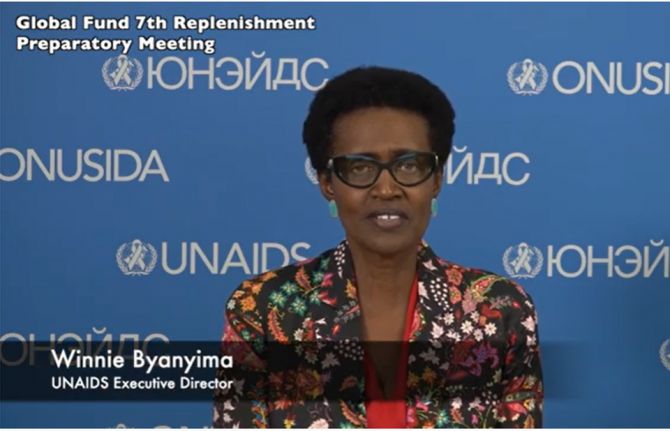

Press Statement
Investment case for the Global Fund's seventh replenishment technical briefing and discussion
23 February 2022 23 February 2022Message by Winnie Byanyima, Executive Director of UNAIDS and Under-Secretary-General of the United Nations
Excellencies, distinguished guests, colleagues and friends,
I am sorry not to be with you in person today.
This year will be 41 years since the first cases of AIDS were reported, 26 years since the Joint United Nations Programme on HIV/AIDS started its work and 21 years since the Global Fund to Fight AIDS, Tuberculosis and Malaria (Global Fund) partnership came into existence. Since then, communities, countries, activists, technical partners and donors have come together to deliver impressive results.
Throughout it all, the Global Fund has been a key player and an important funder of critical interventions. Thanks to Global Fund grants, AIDS-related deaths have dropped by 65% and new HIV infections by 54% since 2002. Global Fund grants support 22 million people on life-saving HIV treatment, keeping them healthy and strong.
And yet the world did not meet the 2020 HIV targets. Progress, which was already off track, is now under even greater strain as the COVID-19 crisis continues to rage, disrupting HIV prevention and testing services, schooling, violence prevention programmes and more. We know that HIV infection makes a person much more likely to die of COVID-19. We also know that sub-Saharan Africa is home to two thirds of people living with HIV. But just over 12% of people in Africa have received two doses of a COVID-19 vaccine. This is a terrible health injustice and one that the AIDS community is far too familiar with given the history of unequal access to the first antiretroviral medicines.
We know that new HIV infections and AIDS-related deaths follow the fault-lines of inequality.
Women and girls account for the majority of new HIV infections in sub-Saharan Africa—six in seven new HIV infections among adolescents are among adolescent girls. This shocking disparity all is about discrimination against girls and women in society and social norms that tolerate violence and exclusion.
In 2020, key populations, including sex workers, gay men and other men who have sex with men, people who inject drugs and transgender people, and their sexual partners accounted for 39% of new HIV infections in sub-Saharan Africa, 65% of new infections globally and a staggering 94% in the Asia–Pacific region.
To close the inequality gaps that drive AIDS, last year we adopted the Global AIDS Strategy 2021–2026: End Inequalities, End AIDS. That strategy sets out evidence-informed priority actions and bold targets to get every country and every community on track to end AIDS as a public health threat by 2030.
Achieving the goals and targets of the Global AIDS Strategy 2021–2026 requires that annual HIV investments in low- and middle-income countries rise to a peak of US$ 29 billion by 2025. This is of course a shared responsibility, with domestic and international resources coming together.
The strategy was reaffirmed by the bold United Nations Political Declaration on AIDS, adopted at the United Nations General Assembly in June last year. The new Global Fund strategy is very much in line with the path the world has chosen to end AIDS.
We now need a successful seventh replenishment in order to reach the agreed targets and get back on track towards the 2030 goal of ending AIDS, tuberculosis and malaria.
The Global Fund provides more than 20% of international funding for the HIV response, making it one of the key players in our collective effort to end AIDS. I have no doubt that my friend Peter Sands and Timothy Hallet have set out a very compelling case for a fully funded Global Fund. So many lives and futures, hopes and dreams depend on this!
The United States of America was one of the founding supporters of the Global Fund and is the largest donor and we are delighted that the United States is hosting the seventh replenishment conference—a clear sign of the United States’ steady leadership of global health.
UNAIDS will, as always, support the Global Fund to ensure a successful replenishment and I urge everyone to step up and support it at this critical moment for pandemics, old and new, and global health.
Thank you.
UNAIDS
The Joint United Nations Programme on HIV/AIDS (UNAIDS) leads and inspires the world to achieve its shared vision of zero new HIV infections, zero discrimination and zero AIDS-related deaths. UNAIDS unites the efforts of 11 UN organizations—UNHCR, UNICEF, WFP, UNDP, UNFPA, UNODC, UN Women, ILO, UNESCO, WHO and the World Bank—and works closely with global and national partners towards ending the AIDS epidemic by 2030 as part of the Sustainable Development Goals. Learn more at unaids.org and connect with us on Facebook, Twitter, Instagram and YouTube.
